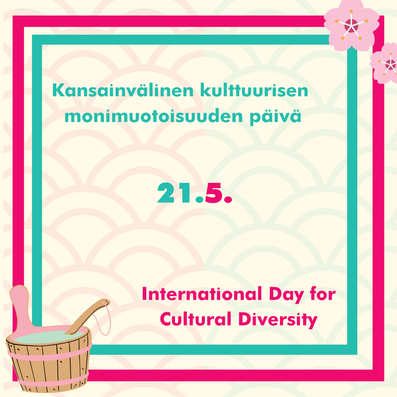If my spouse and I talk about music or movies, cultural references often have to be explained because we did not grow up watching and listening to the same things. Cultural and religious festivals also need to be agreed upon in advance since we both celebrate different ones in our family of origin. Today, May 21st is the International Day for Cultural Diversity, a day on which all kinds of cultures and families are celebrated — especially those that do not resemble typical families in which there is one mom, one dad and everyone shares the same cultural and linguistic backgrounds. When we navigate the realm of families, International Day for Cultural Diversity acknowledges that families can look very different, with family members speaking different languages, sharing different backgrounds, and sometimes having just one parent, or two moms or two dads. It is said that there are two types of families: the one you are born into, and the one you choose. We spend our first 20 or so years in the family in which we are born, but we are lucky we get to spend the rest of our lives with the family we have chosen. For some of us, the family we choose can be very different from the one we were born into. We can choose to partner with someone from a completely different country, culture, and linguistic background, which is what happened in my case. We are a multicultural family, with both parents from different countries, speaking different languages and, to top it all, we live in Finland, a country that is not our own.
Not sharing the same cultural or linguistic background as my partner does bring with it its fair share of challenges — for instance, my son's first language is Japanese, which I do not quite understand — but the challenges make us want to try harder to communicate. If my spouse and I talk about music or movies, cultural references often have to be explained because we did not grow up watching and listening to the same things. Cultural and religious festivals also need to be agreed upon in advance since we both celebrate different ones in our family of origin. In other words, we cannot make any assumptions about family life that would perhaps be the norm in other families. Everything has to be invented, thrashed out and agreed upon after much discussion. There are no ready-made cultural scripts for intercultural families to follow, so we just make it up as we go along. But what can be considered a weakness, is also a strength. We can be more forgiving of each other's differences and take arguments less personally. We tend to be more accommodating and open to change. We know and accept the fact that our partner was raised very differently from us, something that is true even in typical families. In the end, despite our differences, we are just as committed to family life as any other family. On that note, here's a warm greeting to all the other families with diverse backgrounds — International Day for Cultural Diversity! May the warmth of your love continue to know no bounds and keep your family together, safe from all storms. S. Arima
0 Comments
Leave a Reply. |
blogi - blogAjatuksia ja kokemuksia elämästä kahden kulttuurin keskellä.
Reflections and experiences from the life of intercultural families. kategoriat
All
osallistuToivotamme sinut lämpimästi tervetulleeksi osallistumaan blogiyhteisöömme: lue, kommentoi ja kirjoita!
Kirjoittajina voivat toimia kaikki kahden kulttuurin arkea elävät ja aiheesta kiinnostuneet. Kynnystä kirjoittamiselle ei tule nostaa liian korkealle ja kirjoittaa voi joko omalla nimellä tai nimimerkillä. Blogissa esitetyt näkökannat ja mielipiteet ovat kirjoittajien omia, eivätkä edusta Familian kantaa. Kahden kulttuurin arki on itsessään kiinnostavaa ja siitä kirjoittaminen voi avata myös itselle uusia näkökulmia! Blogikirjoituksia voi tarjota sähköpostitse (info@ familiary.fi) tai yhteydenottolomakkeen kautta. Lopullisen valinnan julkaistavista jutuista tekee Familian henkilökunta. Tervetuloa mukaan! participate!We warmly welcome you to participate in our blog community: read, comment, and write!
Anyone who lives and works in the world of intercultural families and is interested in the topic is welcome to contribute. The threshold for writing should not be too high, and you can write either under your own name or under a pseudonym. Keep in mind that the views and opinions expressed in the blog are those of the authors and do not represent the position of Familia. The everyday life of intercultural families is interesting and writing about it can also open new perspectives for you! Your story matters and helps to raise awareness about the opportunities and challenges within intercultural families. Blog contributions can be submitted by e-mail (info@ familiary.fi) or via our contact form. Final selection and edition of the stories to be published will be conducted by our staff. Welcome to join us! |
|
|
© Familia 2024


 RSS Feed
RSS Feed

